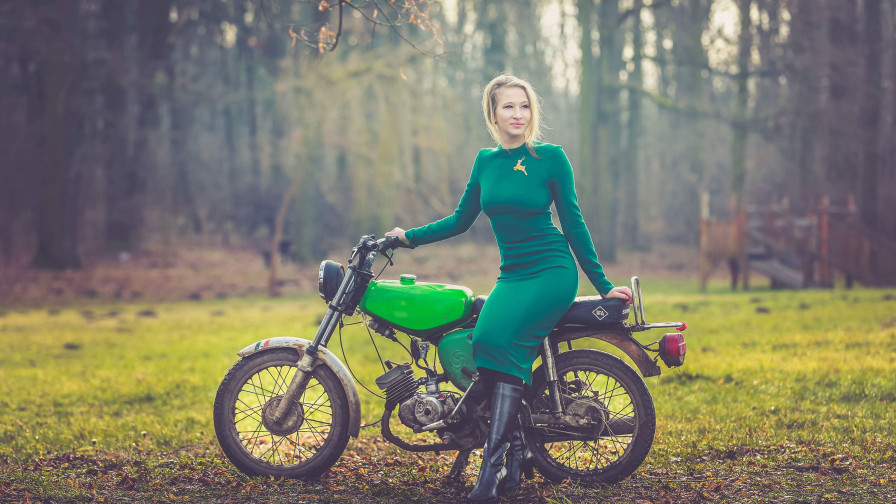Meet Hungary’s Shooting Star - Réka Tenki
In February, Réka Tenki will be introduced to the international film industry in Berlin as one of the Shooting Stars’ programme’s ten promising acting talents of Europe. The last time a Hungarian actor was invited to this Berlinale initiative was in 2009.
What will happen to you in Berlin?
Shooting Stars, the programme I have been invited to, will be held between the 15th and 20th of February this year as part of the Berlin Film Festival. I am one of ten young actors from across Europe who will have a 4-day-long series of meetings with producers, directors and casting directors. There will be discussions and we will also get the chance to attend film screenings. At the end of the festival we will receive an award at the gala. The aim is to give us an opportunity to be recognised at an international level and to participate in productions outside our home countries.
How did you land the role of the psychologist in ‘On Body and Soul’ and how did you prepare for it?
I was chosen after a long process of auditioning for the role. Ildikó Enyedi dreamed up the idea for the movie, created the characters and then cast actors she fell in love with; people she thought were similar to the characters she had dreamed about. I think it was luck that landed me the role. The preparation itself was guided by Ildi, who had a very clear idea of what she wanted. She is very good at instructing actors, so we were able to depend on her entirely. She gave us everything.

Réka Tenki and Krisztián Kolovratnik in Budapest Noir (Picture: Kende Tamás)
The journalist in ‘Budapest Noir’ is your first lead role. How were you cast and what did this mean to you?
The casting was very different with this movie too. I was responsible for being the lead, which was something new compared to what I had done before. I read Vilmos Kondor’s novels, but in order to act out the role I needed to base it on an example of someone who could resemble the character in the book. I found her in Gerda Taro, Robert Capa’s love who became a photographer at the same age as my character in the movie, and sacrificed everything to show people the era in which they lived and the monstrosities that were happening around them. So in this respect Gerda Taro was a great example of bravery. ‘Budapest Noir’ is set in 1936, so everything from makeup to costumes evokes this era. I was required to transform myself for the role, which is always an exciting task.
For last year’s commemoration of the 300th anniversary of Maria Theresa’s birth, a series was made in an Austrian-Czech-Hungarian-Slovakian co-production. The director, Robert Dolnhem, lives in America but was born in Timișoara and has quite good Hungarian. During the shooting, everyone spoke their mother tongue. The crew also worked in the Czech Republic, Austria and Italy. Could you tell us a bit about this exciting project?
Robert came to Hungary and held auditions where four of us, Bálint Adorjáni, Ervin Nagy, Zoltán Rátóti and myself, were chosen to represent Hungary in the co-production. I spent 10 days working on the movie. The shooting was very funny as everyone was talking in a different language. It was not at all stressful, even though I never knew when the actual shooting was going to start, as they were talking in Czech and I don’t speak Czech. After a while I had to learn that akční is not the sound of sneezing but means that shooting has begun and we should pay attention. It is always a pleasure to meet and learn from colleagues of the same age who come from different countries.
In what way is a co-production different?
The journey is different, but the level of quality is the same. If the director is good and prepared and there is a good relationship between the crew members, then it doesn’t matter where you happen to be in the world, because work will always be work and everyone tries to do their own, putting a lot off effort into it. Being aware that you are working abroad is what makes it different.
In 2015 Jurányi Incubator House premiered the monodrama Egyasszony (‘One Woman’), which was a great success and is still in the repertoire. What should we know about this play?
Egyasszony was adapted to the stage from the tragic story of Éva Péterfy-Novák, which was originally a blog before it became a novel. I accepted the role because we wanted to talk about her story, which stands out as an example showing that no matter what happens to a person, it is still possible to go on, to learn to live with difficulties and tragedies such as the loss of a child. We had the play’s 102nd performance, and I’m really proud that we got this far.
How would you describe your relationship with Alexandra Borbély?
It is always good to connect with people who are able to be themselves. There is no competition or jealousy, and we can be happy about each other’s success. When we sit down to have a chat, the main topic is not work but rather what’s going on in our personal lives. And because we have this, it’s great that we don’t feel uncomfortable in the other’s company and we can just be, cook, talk, drink, laugh or help the other if need be.
Ádám Hujber
